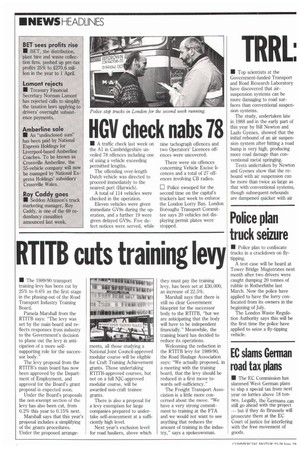RTITB cuts training le
Page 6

If you've noticed an error in this article please click here to report it so we can fix it.
• The 1989/90 transport training levy has been cut by 25% to 0.6% as the first stage in the phasing-out of the Road Transport Industry Training Board.
Pamela Marshall from the RT1TB says: "The levy was set by the main board and reflects responses from industry to the Government's decision to phase out the levy in anticipation of a more selfsupporting role for the successor body."
The levy proposal from the RTITB's main board has now been approved by the Department of Employment, and approval for the Board's grant proposal is expected soon.
Under the Board's proposals the non-exempt section of the levy has also been cut, from 0.2% this year to 0.15% next.
Marshall says that this year's proposal includes a simplifying of the grants procedures. Under the proposed arrange merits, all those studying a National Joint Council-approved modular course will be eligible for Craft Training Achievement grants. Those undertaking RTITB-approved courses, but not on a full NJC-approved modular course, will be awarded non-craft trainee grants.
There is also a proposal for a levy exemption for large companies prepared to undertake self-assessment at a sufficiently high level.
Next year's exclusion level for road hauliers, above which they must pay the training levy, has been set at £30,000, an increase of 22.5%.
Marshall says that there is still no clear Government blueprint for the successor body to the RTITB, "but we are anticipating that the body will have to be independent financially." Meanwhile, the training board has decided to reduce its operations.
Welcoming the reduction in the RTITB levy for 1989/90, the Road Haulage Association says: "We actually proposed, in a meeting with the training board, that the levy should be reduced in a first move towards self-sufficiency."
The Freight Transport Association is a little more concerned about the move. "We have a very strong commitment to training at the FTA and we would not want to see anything that reduces the amount of training in the industry," says a spokeswoman.














































































































































































